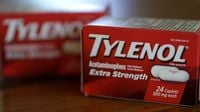On Monday, September 22, 2025, President Donald Trump ignited a new wave of controversy by claiming that acetaminophen, the active ingredient in Tylenol, is linked to autism—a statement that has been met with swift and forceful opposition from leading medical experts and organizations. Speaking from the White House alongside Health and Human Services Secretary Robert F. Kennedy Jr., Trump announced that the U.S. Food and Drug Administration (FDA) would immediately notify physicians to recommend that pregnant women avoid Tylenol unless it is absolutely necessary, such as in cases of extremely high fever.
"They are strongly recommending that women limit Tylenol use during pregnancy unless medically necessary," Trump declared, according to ABC News. He went further, urging pregnant people, "Don't take Tylenol. There's no downside. Don't take it. You'll be uncomfortable. It won't be as easy, maybe. But don't take it if you're pregnant. Don't take Tylenol, and don't give it to the baby after the baby is born." At times, Trump acknowledged that he was offering his own opinion rather than strictly citing scientific research, saying, "You know, I'm just making these statements from me. I'm not making them from these doctors... I talk about a lot of common sense."
The administration also announced the start of an approval process for leucovorin—a drug typically used in cancer and anemia treatment—as a potential therapy for autism, despite limited evidence of its effectiveness for this purpose. The FDA plans to update the label for acetaminophen with additional information about the purported risk, and to launch a nationwide public service campaign to "inform families and protect public health." These moves, officials said, are part of an effort to address America's rising autism rates, which have increased in recent years, with the Centers for Disease Control and Prevention (CDC) estimating that 1 in 31 eight-year-old children received an autism diagnosis in 2022.
Yet the science behind these announcements is, at best, unsettled. A 2025 meta-analysis cited by federal officials, conducted by researchers at Mt. Sinai, the Harvard T.H. Chan School of Public Health, UCLA's Fielding School of Public Health, and UMass Lowell, examined 46 studies and found an association between prenatal acetaminophen exposure and diagnoses of neurodevelopmental disorders—including autism and ADHD—in children. However, the authors of the review were clear: their work did not prove causation, nor did they recommend that pregnant patients stop using Tylenol. As Dr. Andrea Baccarelli, dean at Harvard T.H. Chan School of Public Health, told ABC News, "[A]s the only approved medication for pain and fever reduction during pregnancy, acetaminophen remains an important tool for pregnant patients and their physicians. High fever can pose risks to both the mother and the fetus, including neural tube defects and preterm birth."
Other large studies, such as a Swedish cohort of 2.5 million children, found that the modest increases in autism risk associated with acetaminophen use disappeared when controlling for confounding variables, such as maternal infections or psychiatric conditions. Dr. Danelle Fisher, a board-certified pediatrician at Providence Saint John’s Health Center, told Healthline, "There is no proof that acetaminophen causes autism, period." Dr. Christine Feigal, vice chair of OB-GYN at MemorialCare Long Beach Medical Center, added, "Confounding variables... are common and difficult to erase in these studies." She continued, "Acetaminophen is one of the few safe pain and fever medications we have to offer patients in pregnancy, and avoiding treatment can have its own consequences."
The FDA, for its part, issued a note to doctors on Monday evening, acknowledging that "an association between acetaminophen and autism has been described in many studies, [but] a causal relationship has not been established and there are contrary studies in the scientific literature." The agency stated that the association remains an ongoing area of scientific debate.
Major medical organizations responded with unequivocal criticism. The American College of Obstetricians and Gynecologists (ACOG) issued a statement reaffirming the safety of acetaminophen for pregnant women. Dr. Steven Fleischman, ACOG president, said, "Suggestions that acetaminophen use in pregnancy causes autism are not only highly concerning to clinicians but also irresponsible when considering the harmful and confusing message they send to pregnant patients, including those who may need to rely on this beneficial medicine during pregnancy." He added, "Today's announcement by HHS is not backed by the full body of scientific evidence and dangerously simplifies the many and complex causes of neurologic challenges in children."
The American Academy of Pediatrics (AAP) echoed these concerns, stating the White House announcement was "filled with dangerous claims and misleading information that sends a confusing message to parents and expecting parents." The AAP also pushed back against additional claims by Trump linking vaccines to autism, reiterating, "There is no single, root cause of autism, and there is no single medication that will give every autistic child or adult what they need." The American Psychiatric Association similarly emphasized that "a strong base of evidence shows that acetaminophen, when taken as directed, is safe for use during pregnancy." The APA also noted, "Leucovorin... has not been a recommended treatment for autism. It will require many more years of research before we know if leucovorin is an appropriate treatment for individuals with autism."
The Coalition of Autism Scientists was even more blunt, labeling the administration's information as "fear-inducing" and warning that "the data cited do not support the claim that Tylenol causes autism and leucovorin is a cure, and only stoke fear and falsely suggest hope when there is no simple answer."
Leucovorin, the drug highlighted by the administration as a potential autism therapy, is a form of folate (vitamin B9) typically used in cancer and anemia treatments. Some small studies have suggested it may improve certain symptoms in children with autism, particularly for those with metabolic anomalies affecting folate transport to the brain. However, the scientific consensus is that research is still in its early stages, and more studies are needed before leucovorin can be recommended as a mainstream treatment for autism. As Dr. Fisher noted, "Leucovorin has been studied on a small scale with some behavioral improvements in children with autism, but no large-scale studies have demonstrated a consistent finding. This may be an important area for future research, but the science is not yet well established."
Meanwhile, the makers of Tylenol, Kenvue, pushed back forcefully against the administration's claims. In a statement to ABC News, the company said, "We believe independent, sound science clearly shows that taking acetaminophen does not cause autism. We strongly disagree with any suggestion otherwise and are deeply concerned with the health risk this poses for expecting mothers." Kenvue described acetaminophen as "the safest pain reliever option for pregnant women as needed throughout their entire pregnancy," and said it would "continue to explore all options to protect the health interests of American women and children." Following the administration's announcement, Kenvue's stock price fell by more than 9%, according to The Wall Street Journal.
Autism spectrum disorder (ASD) is a complex, multifactorial neurological condition affecting communication, behavior, and learning. Experts agree that genetics play a significant role, with additional factors such as parental age and certain environmental exposures potentially contributing. The rise in autism diagnoses in recent years is widely attributed to improved awareness, better screening, and broadened diagnostic criteria, rather than a sudden surge in risk factors.
As the debate over the safety of Tylenol during pregnancy continues, one thing is clear: the scientific community remains unconvinced by claims of a definitive link between acetaminophen and autism. For now, leading experts urge caution, emphasizing the importance of evidence-based recommendations and warning against policies that could undermine the health of millions of pregnant women and their children.



